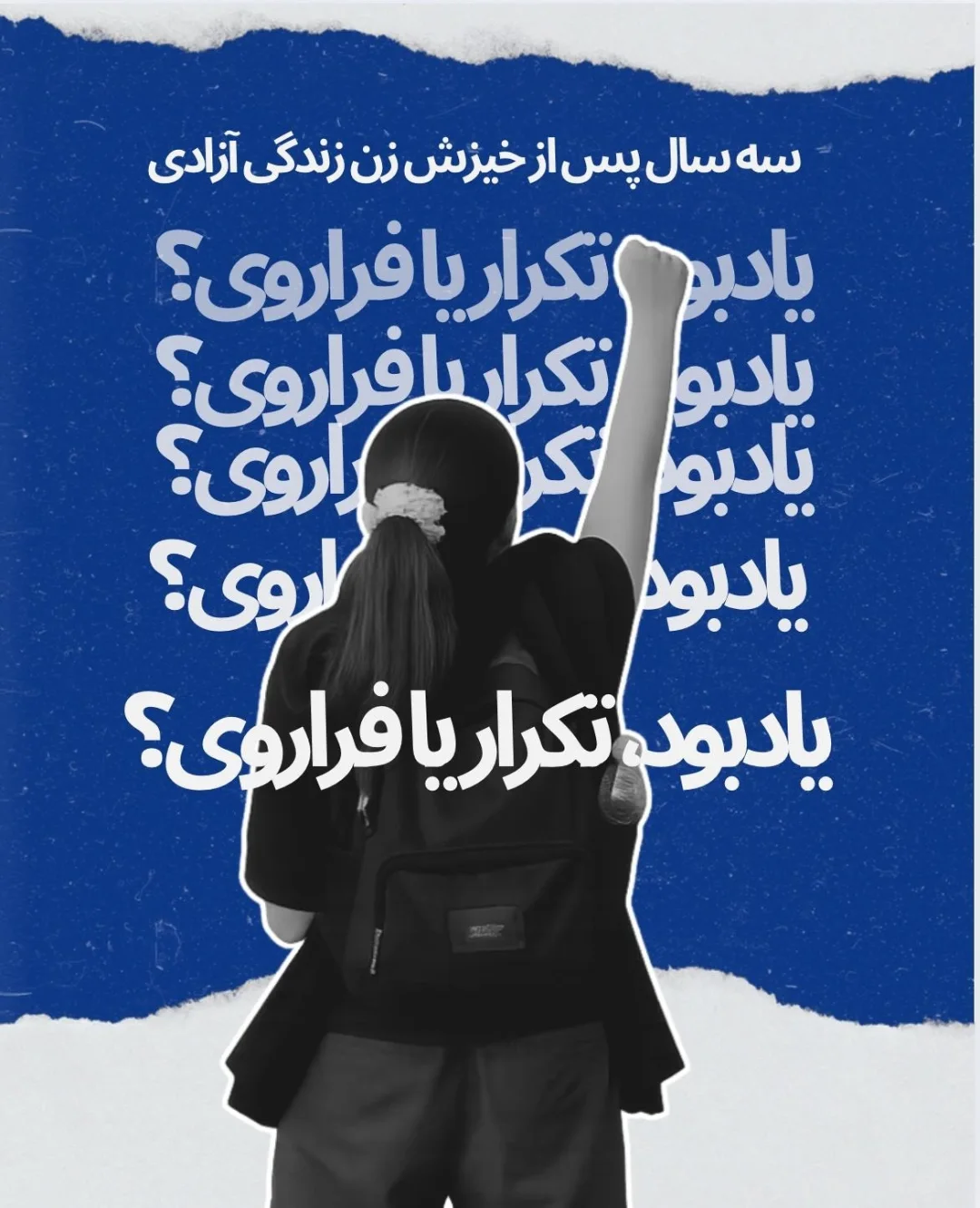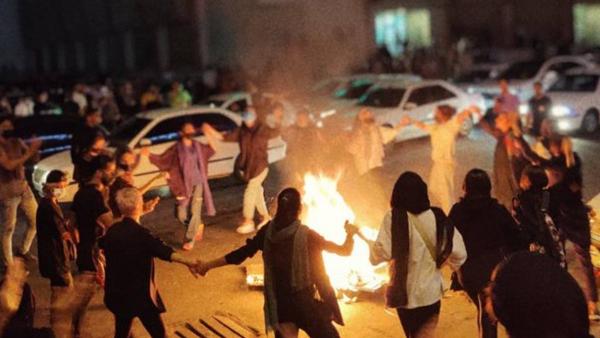Recent News from the Global Movement
Release the Detainees from the Lawyers Memorial
Sign and share: Release 50 detained in Iran, including Narges Mohammadi
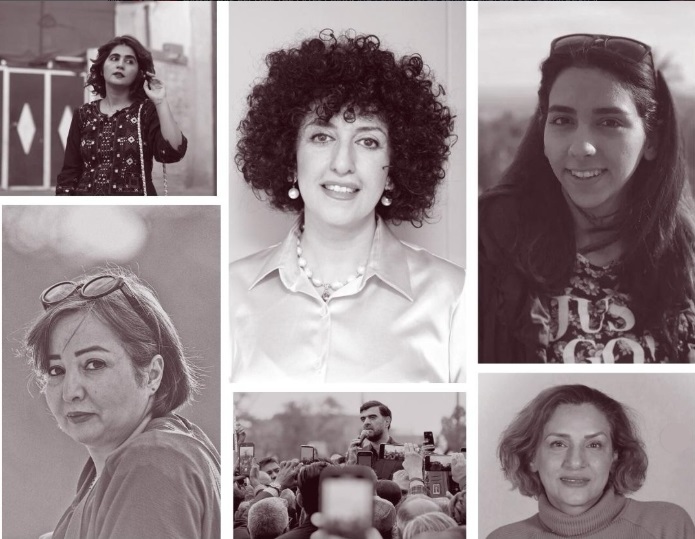
A joint statement has been issued in protest against the arrest of about 50 participants in the memorial ceremony for Khosrow Alikordi, a lawyer and human rights defender. The statement brings together— for the first time— the signatures of over 1000 prominent voices from a wide range of backgrounds: political, civil, and labor activists; prominent artists and journalists; families of those killed, former cellmates; independent lawyers; and students and professors. Signatories include, courageously, activists inside Iran.
Many of the approximately 50 arrestees remain in detention with little or no contact with family or lawyers, injured and/or in need of medical care, so time is of the essence for their safety. Share with friends and colleagues!
The International Emergency Campaign to Free Iran’s Political Prisoners Now (IEC) urges you to sign and circulate this petition on change.org, and share with friends and colleagues:
On the right to mourn and to demand freedom
20 Dec 2025
Tehran – Iran
More than 50 citizens and civil society activists, including Narges Mohammadi, Alieh Motalebzadeh, Hasti Amiri, Sepideh Gholian, and Pouran Nazemi, were arrested in Mashhad during the memorial ceremony for Khosrow Alikordi, a principled lawyer and human rights defender.
We, the signatories of this statement, strongly condemn the arrest of participants in this ceremony. We condemn the violent arrest and the beating of our loved ones present at the memorial. We also condemn the complicity of those who accompanied this unrestrained violence with inhumane behavior. What happened in Mashhad was a trampling of all aspects of human dignity.
Holding memorial and mourning ceremonies for the deceased is an inseparable part of fundamental human and civil rights. Every person has the right, without fear of threats or arrest, to participate in mourning rituals, peaceful gatherings, and civil activities. What occurred in Mashhad once again showed that even the simplest and most humane forms of collective empathy are met with repression and violence.
Nevertheless, the widespread presence of citizens from various parts of the country at the memorial for Khosrow Alikordi is a clear sign of social solidarity and the deep respect of people who consider the suffering of others as their own and do not remain silent in the face of injustice.
We call for the immediate and unconditional release of all detainees and emphasize their fundamental right to access phone calls, family visits, independent legal counsel, and medical care. We also call on all those who believe in civil liberties and human dignity to stand alongside political and civil prisoners and be their voice.
Narges Mohammadi, Sepideh Gholian, Javad Alikordi, Abolfazl Abri, Pouran Nazemi, Hassan Bagheri-Nia, Tayebeh Nazari, Alieh Motalebzadeh, Ali Adinehzadeh, and Hasti Amiri are among the civil society figures who were arrested during the ceremony.
(continued ...)
While authorities have confirmed the arrest of 39 people in Mashhad, human rights activists say the number of detainees exceeds 50. According to lists published on social media and reports by human rights sources, the names of Mohammadreza Babaei, Javad Jalali, Hamed Zare’, Heydar Chah-Chamandi, Mahmoud Khanali, Amir Khavari, Hamed Hosseini, Mohammad Hossein Hosseini, Noora Haghi, Hamed Rasulkhani, Mehdi Rasulkhani, Yaser Dehestani, Kamran Alikordi, Milad Fattah, Hossein Mohabbati, and Pouria Najjarzadeh have also been cited among those detained.
Support this statement by adding your signature : https://c.org/SmTJynFMZg
Over 1,000 political and civil activists, journalists, filmmakers, students, academics, and former cellmates issue joint statement protesting recent arrests in Mashhad Iran. Among the signatories of this statement is a wide range of well-known figures:
from artists and cultural activists such as Jafar Panahi, Taraneh Alidoosti, Rakhshan Bani-Etemad, Mohammad Rasoulof, Pantea Bahram, Pegah ahangarani, Sohila Golestani, Farzaneh Taheri, Shabnam Farshadjoo, Fatemeh Motamed-Arya, Mohsen Amiryoussefi, Fardin Khalatbari, Reza Dormishian, Maryam Palizban, Sepideh Farsi, Barbad Golshiri, and Hana Kamkar, to prominent journalists including Elaheh Mohammadi, Niloufar Hamedi, Mina Akbari, Nasim Soltanbeigi, and Lily Farhadpour.
Among the signatories of this statement is a wide range of well-known figures: from artists and cultural activists such as Jafar Panahi, Taraneh Alidoosti, Rakhshan Bani-Etemad, Mohammad Rasoulof, Pantea Bahram, Sohila Golestani, Farzaneh Taheri, Fatemeh Motamed-Arya, Mohsen Amiryoussefi, Fardin Khalatbari, Reza Dormishian, Maryam Palizban, Sepideh Farsi, Barbad Golshiri, Hana Kamkar, Shabnam Farshadjou, and Pegah Ahangarani, to prominent journalists including Elaheh Mohammadi, Niloufar Hamedi, Mina Akbari, Nasim Soltanbeigi, and Lily Farhadpour.
Among the signatories are also notable lawyers such as Abdolfattah Soltani, Amir Salar Davodi, and Dr. Mahmoud Behzadi. Families seeking justice, including Parasto Frouhar, Parisa Pouyandeh, Manzar Zarabi, Atash Shakeri, Shahnaz Akmali, and Monireh Baradaran; feminist and women’s rights activists such as Fatemeh Farhangkhah, Noushin Ahmadi Khorasani, Parvin Ardalan, Mansoureh Shojaei, and Shahrzad Mojab; as well as human rights defenders like Shiva Nazar-Ahari and Mahdieh Golrou, have also expressed their support.
Political figures including Nahid Taghavi, Mansoureh Behkish, Naser Mohajer, Sara Siahpour, Farhad Meisami, Parvaneh Salahshouri, Fakhri Mohtashami-Pour, Morteza Alviri, Mahdi Mahmoudian, Siamak Namazi, Abdollah Momeni, Reza Alijani, and Iman Vaghfi, along with student activists such as Fereshteh Toosi, university professors including Touraj Atabaki, Dr. Mohammad Reza Nikfar, Dr. Javad Emami, Dr. Abolfazl Shayan, and Dr. Mohammad Reza Resaei, as well as political prisoners like Saeed Madani, Mostafa Tajzadeh, Zartosht Ahmadi Ragheb, and Mohammad Najafi, are also listed among the signatories.
In addition, former cellmates such as Vida Rabbani, Bahareh Soleimani, Zhila Makvandi, Maryam Mohammadi, Raha Asgarizadeh, Samin Ehsani, and Noushin Jafari; families of martyrs including Asieh Bakri; veterans like Mohammad Bagher Bakhtiar; labor and teacher activists such as Zhila Modares Gorji, Mohammad Habibi, and Esmaeil Abdi; and environmental activists including Sepideh Kashani, Houman Jokar, and Niloufar Biani have also signed and supported this statement.Beyond a simple protest against one arrest, this statement is a rare sign of unity and shared purpose, cutting across the significant political and intellectual divisions currently fragmenting Iran.
For a list of signatories, and the full text in Farsi, go here.
Statement from former Iranian political prisoner Sussan Golmohammadi
The People of the World Need the Defeat of Fascism in the U.S.!
This letter was written and sent to the IEC by a former political prisoner from Iran, Sussan Golmohammadi. In 2023, she delivered a moving internationalist statement from Burn the Cage/Free the Birds (Iran’s political prisoners support movement in Europe) at the May Day celebration in Los Angeles. In years past, she had also been a speaker at several International Women’s Day celebrations in L.A.
I write this letter as a former political prisoner from the 1980s in the Islamic Republic of Iran. I am someone who desires a fundamental change and a better future than this capitalist-imperialist exploitative system that today has a fascist regime in the U.S. at its helm. My husband, Iraj Shirali, was executed (among 21 other revolutionaries) by Iran’s fascist theocratic rulers in 1982. He was only 27 years old, but was already a leader in the Union of Iranian Communists.
I strongly support the Call by refusefascism.org to flood Washington, DC beginning Nov. 5 in the largest non-violent mobilization in U.S. history, to demand, “THE FASCIST TRUMP REGIME MUST GO NOW!”
I can testify that there is no living with a fascist regime — not in Iran, and not in the U.S. It must be defeated and driven from power. What fascism demands of you is unacceptable and unimaginable. At every level of society, in every institution, tens of millions of us know this with our entire beings.
To all the decent people in the U.S.:
I urge you to be determined and steadfast in defeating and ousting the Trump/MAGA fascists! The fascist Trump regime is illegitimate. Do not let this fascist regime send the people of the world to the hell that it has unleashed and is preparing! Turn your powerful anger into a massive force. Be present and besiege DC with your nonviolent protest beginning November 5, with the aim of driving out the fascist Trump regime.
Millions of people hate fascism and injustice. Urgently contact everyone, including those in the Iranian Diaspora, to go to DC and donate to November 5. Ask your family, friends, networks and organizations and institutions to give their support. Do not relent in your struggles until Trump is removed from office! Act as if the future of humanity is in your hands.
To all the people of the world who hate injustice:
A fascist U.S. is an existential danger to humanity. Join me and all those who stand in solidarity with the millions in the U.S. who are refusing to accept a fascist America! Amplify and spread their call to “Flood DC in Nonviolent Resistance Beginning Nov. 5” to demand “Trump Must Go Now!” Send internationalist statements of support to refusefascism.org.
“If we dare, we can defeat a horror that threatens humanity's very survival. If we fail to even try, future generations—if they exist—will never forgive us.”
Dare to struggle! Dare to win!
Sussan Golmohammadi
Former political prisoner in Iran, 1982-1985
Call from University students to take up and broaden fight against executions
World Day Against the Death Penalty
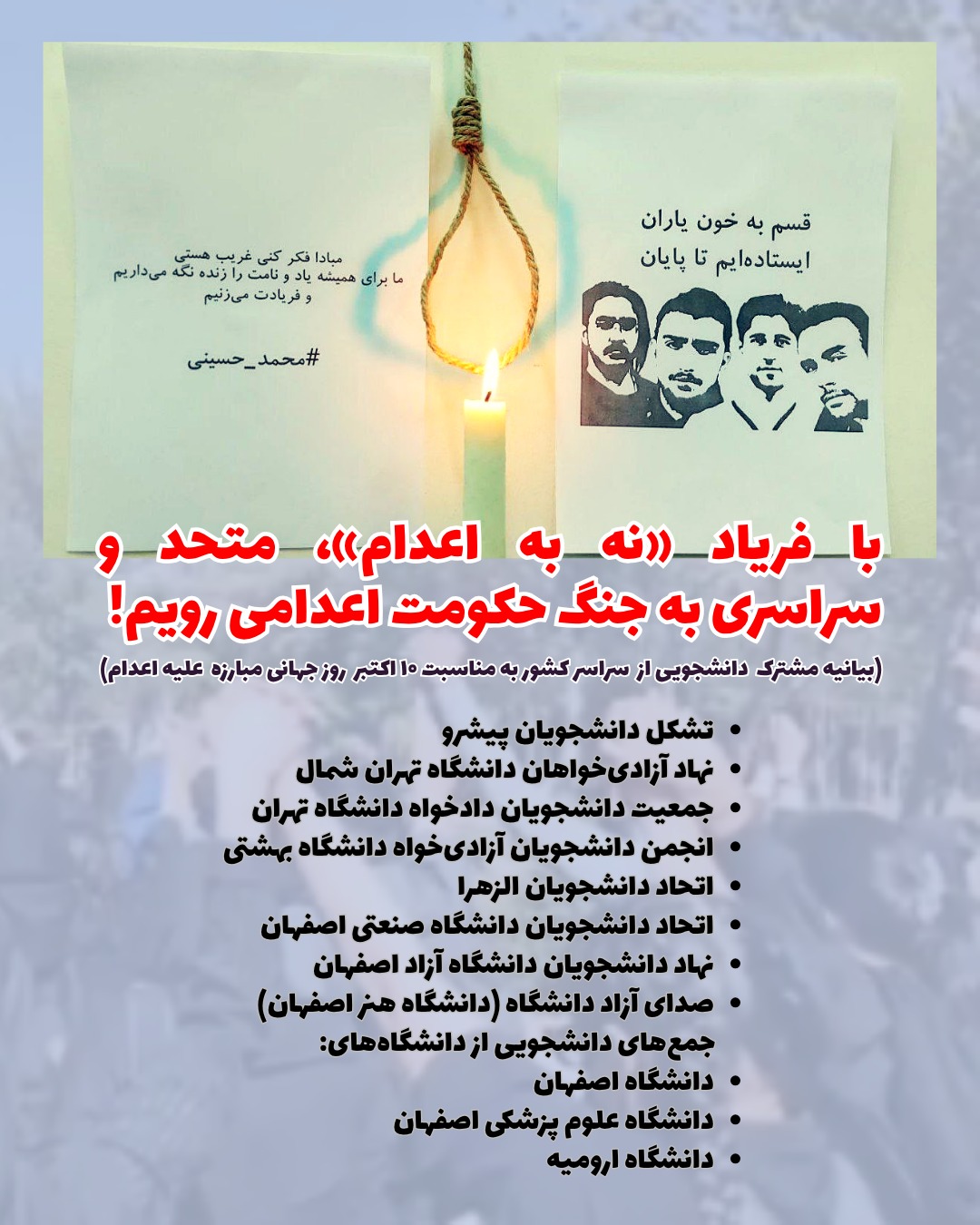
On October 10, 2025, World Day Against the Death Penalty, 11 university student groups in Iran posted a statement calling for students to make “a more organized and nationwide fight against execution one of our focuses in overthrowing the Islamic Republic.” This represents an important step in widening and strengthening the struggle against executions, which has thus far been based primarily among prisoners and their families. It also represents a call to students to take up struggles outside of their immediate concerns as their own, which is a key element in any progressive or revolutionary movement.
Graphic by @isfahan.uni; Farsi text reads: “Unite and Fight against the death penalty, shouting ‘No to executions!’ Joint Statement of students around the country on the occasion of October 10, WorldDay Against the Death Penalty”. Illustration shows faces of four of the at least 12 Women, Life, Freedom protesters who have been executed.
List of signing organizations:
· #ProgressiveStudentsOrganization
· North Tehran University Freedom Seekers Organization
· Tehran University Student Law Association
· Beheshti University Society of Liberal Students
· Al-Zahra Students Union
· Isfahan University of Technology Students Union
· Isfahan Azad University Students Association
· Free Voice of the University (Isfahan ArtUniversity)
· University of Isfahan students
· Isfahan University of Medical Sciences students
· University of Urmia students
Read the full statement, translated to English by IEC volunteers, below.
The World Day Against the Death Penalty comes at a time when the Islamic Republic has nearly doubled the number of executions this year compared to last year. [October 2024 to October 2025]
Imagine that during the time you read this Statement line by line, many people are waiting in the black holes of this criminal regime for the moment of their murder. The regime kills and takes life in order to remain and continue its systematic murder, plunder and aggression.
This state-sponsored murder is not only a systematic oppression and crime, but also means the slaughter of the concept of humanity. Therefore, we write this statement to the free people and call on everyone to consider the united and universal fight against executions as an integral part of our activities and to make a more comprehensive effort to permanently abolish this disgrace on the face of human society.
We appreciate the ongoing struggle against the death penalty and are reminded that each of us is fighting a government that ranks first in committing this organized state crime worldwide. Therefore, it is essential that a large part of our struggle be dedicated to this issue.
What we need to consider in our struggles against the death penalty
- The Islamic regime is trying to avenge its losses in the 12-day war by Israel against the Iranian people and is murdering its opponents under the pretext of espionage for Israel, but really to ensure its own security.
- The revenge of these criminals has engulfed all sectors of society from students and labor activists to ethnic groups, women and queers, we are all standing in an endless line to execute the sentence, and our turn has not yet come… Therefore, all of us in various protest movements must actively and unitedly take action against executions.
- The Islamic Republic always highlights a range of crimes in the fight against the death penalty, which, although not political in nature, are handed over to the most political tool of the government, the gallows. Let us not forget the #No_to_the_death_penalty means saying “NO” to all executions, from political prisoners to drug convicts to whatever the thugs call “criminal cases”.
- Those sentenced to death and their families, regardless of the “crimes” attributed to them, must act unitedly in the fight against this inhuman punishment. Execution is a political decision of the government, and those sentenced to non-political crimes have entered the political arena, whether they choose to or not.
- The Tuesday No to Executions campaign [weekly hunger strike by prisoners currently at 52 prisons throughout Iran] is a militant and humane achievement resulting from the Woman Life Freedom rebellion. We must guard this valuable achievement and express solidarity with political prisoners every week and expand it.
- Disarming the death penalty regime requires comprehensive and nationwide protests against the death penalty by all sectors of society; on this basis, one of the main axes of daily protests by worker, retirees, teachers, students, nurses, etc., should be a consistent struggle against the death penalty.
- Any political solidarity, coalition and alliance based on “Woman Life Freedom” and to overthrow the Islamic Republic regime must include the fight against the death penalty and the permanent abolition of this medieval sentence among its basic principles.
We, students from across the country, emphasize that a more organized and nationwide struggle against the death penalty is one of our focuses on the path of overthrowing the Islamic Republic.
The execution regime must be destroyed
Victory to the #WomanLifeFreedom revolution
From Colombia In Solidarity with 3rd Anniversary of Woman, Life, Freedom Uprising
Calling for Freedom for Political Prisoners in Iran and No War in Middle East!
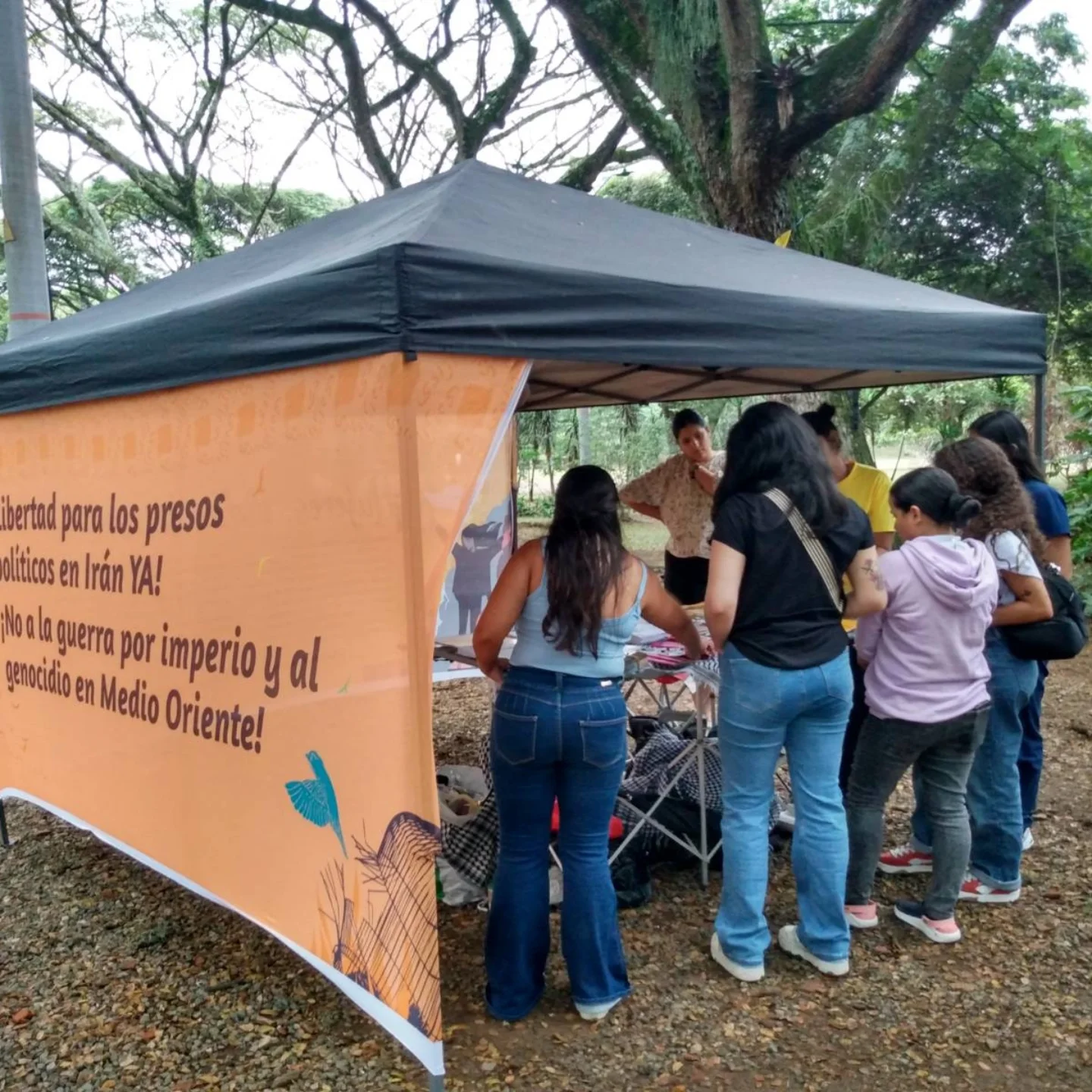
On September 21, 2025, Quemar La Jaula posted from Cali, Colombia about a commemoration of the third anniversary of the Gina Uprising with displays and discussions in a public park. Read on for English and Spanish descriptions and photos.
On the anniversary of the Gina Amini [Woman, Life, Freedom] uprising, a discussion activity was held with friends and passers-by at the Parque del Ingenio in Cali, Colombia. After more than four decades of repression, discrimination, oppression and exploitation, the killing of Gina Amini at the hands of the reactionary Islamic Republic of Iran in 2022, transformed smoldering anger into a revolutionary uprising across Iran. The regime tried to extinguish it with a bloody repression, but the resistance of women to mandatory wearing of the hijab, the perseverance of political prisoners in seeking justice, and the resistance of oppressed nationalities, keep the cry of freedom on the lips of millions. But will it be freedom of the exploiters and oppressors to keep the old regime with new faces at the top --or freedom of the oppressed to smash the old order and replace it with something far better? (translated from Spanish by IEC volunteers)
En el Parque del ingenio en Cali, en el aniversario del levantamiento de Gina Amini se realizó una actividad de discusión con amigos y transeúntes. Tras más de cuatro décadas de represión, discriminación, opresión y explotación, el asesinato de Gina Amini a manos de la reaccionaria República Islámica de Irán en 2022, transformó la ira acumulada en un levantamiento revolucionario por todo Irán. El régimen intentó extinguirlo con una represión sangrienta, pero la resistencia de las mujeres al uso obligatorio del hiyab, la perseverancia de los presos políticos en busca de justicia, y la resistencia de las nacionalidades oprimidas, mantienen el grito de libertad en los labios de millones. Pero, ¿será libertad de los explotadores y opresores para mantener el viejo régimen con caras nuevas en la cima, o la libertad de los oprimidos para destrozar el viejo orden y reemplazarlo con algo mucho mejor?




